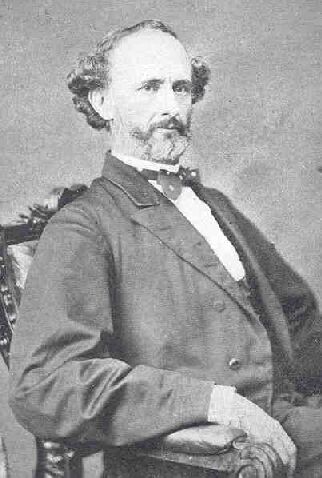Henry Pelham Holmes
Bromwell

(1823-1903)
Illinois & Colorado

frontis photograph
Henry Pelham Holmes Bromwell, The Song of the Wahbeek: A Poem
(Denver: Henrietta E. Bromwell, Publisher, 1909)
Henry Pelham Holmes Bromwell was born in Baltimore,
Maryland in 1823 and his family moved to Cincinnati, Ohio, in 1824,
and then on to Cumberland, Illinois in 1836. He attended Marshall
Academy, in Marshall, Illinois, and stayed on as an instructor.
He studied law and was admitted to the bar in 1853, starting his
law practice in Vandalia, Illinois. He edited his father's newspaper,
served as judge of Fayette County, Illinois (1853-1857) and was
active in the the Republican Party. Bromwell was first elected to
Congress in 1865 and served for two terms before being defeated
in 1868. In 1870 he moved to Denver, Colorado, and again took up
the practice of law. He was president of the Denver School Board
from 1871 to 1874, and a delegate to the constitutional convention
of Colorado in 1875. He died in Denver, Colorado, on January 7,
1903 and is interred in Denver's Riverside Cemetery. [Source:
Henry
Pelham Holmes Bromwell, Biographical Directory of the United
States Congress]
The preface to The Song of the Wahbeek: A Poem
provides the following biographical sketch:
Henry Pelham Holmes Bromwell died in Denver, Colorado, in 1903.
He was born in Baltimore, Maryland, in 1823, his parents being
Henry Broughton Bromwell, and Henrietta, daughter of Lemuel Holmes
of Plymouth County, Massachusetts.
He was familiar with the character of the Indian and of the pioneer,
and had spent all of the most impressionable years of his boyhood
in the beautiful forests which at that time surrounded the grand
prairies of Illinois, where lingered many traditions of the past,
and where each rock, tree and stream teemed with suggestions of
the religion of the people of the wilderness, and there were many
varieties of birds, animals and flowers, now no more found in
those parts of the world.
In Cumberland, a most romantic little hamlet (now gone and forgotten),
on the old "National Road," near the present town of
Casey, far from schools, churches, and with only the Bible, a
copy of Shakespeare's plays, some few Latin and Green books belonging
to his father (one of which was a collection of Latin hymns),
and a few words on history, altogether constituting a library
of great magnitude for that time and place, his education was
begun, with the forest for his most absorbing study, with the
clouds and the stars.
Many years passed away, some of them spent in Vandalia, the old
state capital, some of them in Charleston. He was teacher, editor,
scholar, lawyer, legislator, jurist, Congressman, and always the
beloved and admired gentleman; unselfish, kind, modest,
cheerful, witty, easily a leader in any place he had part in;
eloquent, most just and generous. His many orations and speeches
delivered in the stormy campaigns during the critical period before
and after the Civil War, made him a figure in state, and indeed,
in national politics.
The extensive range of his studies, and his scholarly acquirements
are shown by his great work on Masonic Symbolry, now being read
in many of the grand jurisdictions of the world. In a resolution
passed by the Grand Lodge of Illinois, this book is referred to
as "The most remarkable contribution, along the lines of
which it treats, yet made to Masonic literature."
McKendree College conferred upon him the Honorary Degree of master
of Arts, in 1867, during the time the distinguished Robert Allyn
was President of the College. On that occasion he read his poem,
The Song of the Wahbeek, by invitation of the Faculty, whose attention
he had attracted by his wide reputation for scholarship. The poem
was at that time condensed for delivery. It was later read to
the Constitutional Convention of Illinois in 1870. Soon after
this he came to Colorado, where he amplified the work, and gave
it its present form.
The love story of Kol-lo-war and Lo-wi-el, which is the gem and
ornament of the poem . . . illustrates the life of a superior
race who occupied the country before the coming of the Indian,
a people who worshiped the sun, and of whose existence the red
race has handed down traditions.
[Note: In addition to Bromwell, other
lawyer poets known for their Masonic writings, include Albert
Pike (1809-1891) and Rob Morris (1818-1888)]
The
Life and Times of H.P.H. Bromwell
My
Father, H.P.H. Bromwell
Henry
Pelham Holmes Bromwell
Biographical Directory of the United States Congress
Henry P.H. Bromwell
Wikipedia

Poems
Selected
Poetry
Poetry
Henry Pelham Holmes Bromwell, The Song of the Wahbeek:
A Poem (Denver: Henrietta E. Bromwell, 1909)
_________________________, The Two Processions: A
Poem (Denver: H.E. Bromwell, 1918)
_________________________, On Buena Vista's Field
and Other Early Poems (Denver: Henrietta E. Bromwell, 1918)
_________________________, The Dead Forest of the
Colorado: A Poem (Denver: Henrietta E. Bromwell, 1918)
_________________________, Poems to Emma (Denver:
Bromwell, 1919)
_________________________, Further Light, and Other
Poems Written for Masonic Occasions, also Tributes to His Friend Abraham
Lincoln (Denver: Henrietta E. Bromwell, 1920)
__________________________, Lute of Israefel, with
other poems and allegories. The Ladder of Bethel, The Sacred Rivers,
and tribute to his friend Abraham Lincoln (Denver, 1920)
Writings
Henry Pelham Holmes Bromwell, Restorations of Masonic
Geometry and Symbolry, Being a Dissertation on the Lost Knowledge
of the Lodge (Denver: H. P. H. Bromwell Masonic Publishing Company,
1905) [online
preview]
_________________________, Translations; from Poems
of Schiller, Schlegel, Uhland, Schwab, Schneckenburger, Chamisso,
Freiligrath, and others (Denver: Bromwell, 1919)
Bibliography
My
Father, H.P.H. Bromwell
Research Resources
Henry Pelham Holmes Bromwell Papers
Colorado Historical Society Library
Denver, Colorado
Index, Ross' Historical Souvenir of Vandalia, Illinois
State Capital, 1819-1837
(a journal of H.B. & H.P.H. Bromwell, Vandalia [Ill.] 1852)
Denver Public Library
&
Illinois State Historical Library
|

